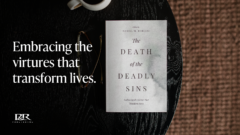I wasn’t expecting to enjoy this book as much as I did. I enjoy reading a good biography as much as anyone, but was perhaps a bit skeptical about a book that, instead of focusing on an individual’s life and accomplishments, instead describes his spiritual and intellectual formation. Yet what could have been a mite dry was actually very compelling.
It may be helpful context to state that I do not know Tim Keller personally and have neither met him nor corresponded with him. I also don’t think I’ve heard him preach more than once or twice. My exposure to him is really only through the three or four of his books that I have read. While I know a good number of people who consider him a major influence on their faith or ministry, I am not among them. I say all that because it means that I was reading about someone who is mostly a stranger, though one I’ve sometimes admired from afar and sometimes had concerns about.
Collin Hansen knows Keller well and came to know him far better in preparing this book. He shares the book’s purpose in the opening pages.
Unlike a traditional biography, this book tells Keller’s story from the perspective of his influences, more than his influence. Spend any time around Keller and you’ll learn that he doesn’t enjoy talking about himself. But he does enjoy talking—about what he’s reading, what he’s learning, what he’s seeing.
The story of Tim Keller is the story of his spiritual and intellectual influences—from the woman who taught him how to read the Bible, to the professor who taught him to preach Jesus from every text, to the sociologist who taught him to see beneath society’s surface. … This is the story of the people, the books, the lectures, and ultimately the God who formed Timothy James Keller.
And so it begins with his childhood and a father who was quite withdrawn and a mother who, though she loved her children, was extremely controlling. She led her family to an Evangelical Congregational church which “emphasized human effort in maintaining salvation and achieving sinless perfection. Both at home and in church, Tim Keller learned this second form of legalism—that of the fundamentalist variety. By the time Tim was leaving home to attend college, he didn’t just know about Martin Luther; he could personally relate to Luther, who had been afflicted with a pathologically overscrupulous conscience that expected perfection from himself in seeking to live up to his standards and potential.”
Keller enrolled as a religion major in Bucknell University where he fell under the influence of InterVarsity Christian Fellowship and soon professed faith in Christ. His connection with InterVarsity would develop within him a zeal for evangelism and a method for reading and understanding Scripture. In this timeframe he would also be exposed to the ministries of John Stott, Elisabeth Elliot, Martyn Lloyd-Jones and others, all of whom would shape him in different ways. Even more importantly, he would come to know Kathy Kristy who would not only become his wife, but also his most formative intellectual and spiritual influence, for when “you’re writing about Tim Keller, you’re really writing about Tim and Kathy, a marriage between intellectual equals who met in seminary over shared commitment to ministry and love for literature, along with serious devotion to theology.”
The book goes on to tell of the influence of C.S. Lewis and J.R.R. Tolkien, of R.C. Sproul and his Ligonier Valley Study Center, and of Francis Schaeffer and L’Abri. It tells of Keller’s time at Gordon-Conwell Theological Seminary and the professors there, and his discovery of the writings of Jonathan Edwards. Then it advances to his first pastorate in Hopewell, Virginia and to his time as a professor at Westminster Theological Seminary, pausing to tell, at length, of the impact of Edmund Clowney. And, then, finally it comes New York City, Redeemer Church, Redeemer City-to-City, and Keller’s many books, along with the people living and dead who played essential roles in helping him develop his strategy for reaching cities for Christ.
Throughout the book, Hansen shows Keller as a man whose foremost gifting is not as an original thinker but as an analyzer and synthesizer who reads deeply and widely, pulling together insights from a host of others. “Having one hero would be derivative; having one hundred heroes means you’ve drunk deeply by scouring the world for the purest wells. This God-given ability to integrate disparate sources and then share insights with others has been observed by just about anyone who has known Keller, going back to his college days. He’s the guide to the gurus. You get their best conclusions, with Keller’s unique twist.” And hence the great conclusion at the end of it all is that if you appreciate Tim Keller the best thing you can do is focus less on him and more on the people who taught and influenced him.
After I finished the book I surveyed its endorsements and thought Sinclair Ferguson’s was especially on-point: “Here is the story of a man possessed of unusual native gifts of analysis and synthesis, of the home and family life that has shaped him, of people both long dead and contemporary whose insights he has taken hold of in the interests of communicating the gospel, and also of the twists and turns of God’s providence in his life. These pages may well have been titled Becoming Tim Keller. That ‘becoming’ has been neither a quick nor an easy road. But Collin Hansen’s account of it will be as challenging to readers as it is instructive.”
Ferguson says it just right. Whether you have been influenced by Keller or not, whether you admire him or not, I believe you will enjoy this account of his life framed around his intellectual and spiritual development. Told through the pen of an especially talented a writer, it is a fascinating and compelling narrative. It may just get you thinking about who has formed you and compel you to praise God for the people, the preachers, the books, and the organizations that have made you who you are.










